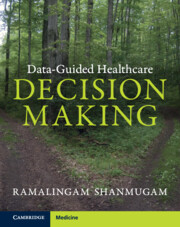Book contents
- Data-Guided Healthcare Decision-Making
- Data-Guided Healthcare Decision-Making
- Copyright page
- Dedication
- Contents
- Figures
- Tables
- About the Author
- Preface
- Glossary
- Notations and Symbols
- Prologue
- Introduction
- Chapter 1 Why and How Healthcare Decisions Are Made
- Chapter 2 Are Data-Guided Healthcare Decisions Superior?
- Chapter 3 Software
- Chapter 4 How to Collect Authentic Data
- Chapter 5 Uncertainties and Their Impact on Healthcare Decisions
- Chapter 6 Why Models Are Important in Healthcare
- Chapter 7 How Healthcare Decision Trees Emerge and Function
- Chapter 8 How Are Group Decisions Practiced in Healthcare?
- Chapter 9 Tracing and Remedying Root Causes of Adversities
- Chapter 10 Healthcare Decision-Making for Cost-Effectiveness
- Chapter 11 Risk Analysis in Healthcare Decision-Making
- Chapter 12 Evaluation of Healthcare Programs
- Chapter 13 Six Sigma and Lean Management in Healthcare Sectors
- Chapter 14 Forecasting in Healthcare Sectors
- Epilogue
- Appendix Statistical Tables
- Index
- References
Chapter 1 - Why and How Healthcare Decisions Are Made
Published online by Cambridge University Press: 13 July 2023
- Data-Guided Healthcare Decision-Making
- Data-Guided Healthcare Decision-Making
- Copyright page
- Dedication
- Contents
- Figures
- Tables
- About the Author
- Preface
- Glossary
- Notations and Symbols
- Prologue
- Introduction
- Chapter 1 Why and How Healthcare Decisions Are Made
- Chapter 2 Are Data-Guided Healthcare Decisions Superior?
- Chapter 3 Software
- Chapter 4 How to Collect Authentic Data
- Chapter 5 Uncertainties and Their Impact on Healthcare Decisions
- Chapter 6 Why Models Are Important in Healthcare
- Chapter 7 How Healthcare Decision Trees Emerge and Function
- Chapter 8 How Are Group Decisions Practiced in Healthcare?
- Chapter 9 Tracing and Remedying Root Causes of Adversities
- Chapter 10 Healthcare Decision-Making for Cost-Effectiveness
- Chapter 11 Risk Analysis in Healthcare Decision-Making
- Chapter 12 Evaluation of Healthcare Programs
- Chapter 13 Six Sigma and Lean Management in Healthcare Sectors
- Chapter 14 Forecasting in Healthcare Sectors
- Epilogue
- Appendix Statistical Tables
- Index
- References
Summary
What is a decision? A decision is the process of selecting one option over others for the sake of some advantages. The advantages might be a minimal use of time or human resources, or constrained and/or gained profits. When no alternative appears that is better than the chosen decision in any sense, that decision is called the optimal decision. Attaining the optimum decision is not quite trivial at times due to the complexity of reality. The decision maker is often in need of technical experts called analysts who can simplify, organize, and make the decision easier for the decision maker. Decision-making is a cooperative effort to reach the optimal decision. When these joint efforts succeed, the decision maker and the analyst are appreciated and applauded. When the decision results in failure with a measurable loss, the decision maker is blamed. The decision maker therefore undertakes full responsibility for directing the decision-making process.
- Type
- Chapter
- Information
- Data-Guided Healthcare Decision Making , pp. 1 - 8Publisher: Cambridge University PressPrint publication year: 2023



